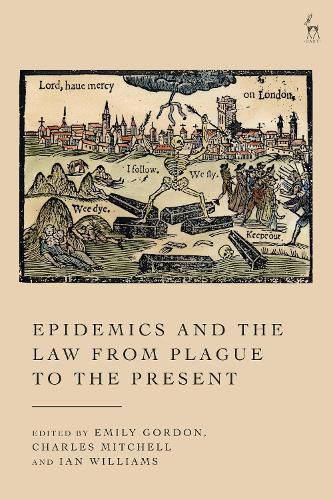Readings Newsletter
Become a Readings Member to make your shopping experience even easier.
Sign in or sign up for free!
You’re not far away from qualifying for FREE standard shipping within Australia
You’ve qualified for FREE standard shipping within Australia
The cart is loading…






This collection of essays presents a socio-legal history of epidemics from the medieval period to the present day.
Building on previous studies of infectious diseases undertaken by social historians of medicine, this collection explores the histories of epidemics and disease by looking at the legal measures deployed against them.
Whilst previous works have considered the mechanisms by which legal change occurs, the social and political assumptions on which new laws and new legal structures are premised and the social changes which follow, this book focuses on the way in which historical actors understood law to be a complex means of responding to disease and the way in which that law shaped (and limited) the responses which could be made to disease.
Taking an interdisciplinary approach, it features contributions from scholars across a range of academic disciplines who consider the wider implications of epidemics and disease beyond the obvious health effects. The collection focuses first on regulatory responses such as the quarantine laws and border policies in the eighteenth century, the framing of 'disease' in the Colonial Immigration Acts in the nineteenth century and the ethics of public health in the twentieth century in Great Britain. It then goes on to consider developments in broader legal doctrine which themselves resulted from social and/or legal responses to disease, including the centralisation of labour regulation in the wake of the black death, property disputes about leper houses, pest houses and fever hospitals, and the prosecution of medical professionals for disease transmission in 19th century England.
Methodologically all the chapters are historical, but a range of approaches has been taken, from quite traditional doctrinal legal history through socio-legal history to traditional political and social history, to bring the history of epidemics and the legal measures deployed against them in to sharp focus.
$9.00 standard shipping within Australia
FREE standard shipping within Australia for orders over $100.00
Express & International shipping calculated at checkout
This collection of essays presents a socio-legal history of epidemics from the medieval period to the present day.
Building on previous studies of infectious diseases undertaken by social historians of medicine, this collection explores the histories of epidemics and disease by looking at the legal measures deployed against them.
Whilst previous works have considered the mechanisms by which legal change occurs, the social and political assumptions on which new laws and new legal structures are premised and the social changes which follow, this book focuses on the way in which historical actors understood law to be a complex means of responding to disease and the way in which that law shaped (and limited) the responses which could be made to disease.
Taking an interdisciplinary approach, it features contributions from scholars across a range of academic disciplines who consider the wider implications of epidemics and disease beyond the obvious health effects. The collection focuses first on regulatory responses such as the quarantine laws and border policies in the eighteenth century, the framing of 'disease' in the Colonial Immigration Acts in the nineteenth century and the ethics of public health in the twentieth century in Great Britain. It then goes on to consider developments in broader legal doctrine which themselves resulted from social and/or legal responses to disease, including the centralisation of labour regulation in the wake of the black death, property disputes about leper houses, pest houses and fever hospitals, and the prosecution of medical professionals for disease transmission in 19th century England.
Methodologically all the chapters are historical, but a range of approaches has been taken, from quite traditional doctrinal legal history through socio-legal history to traditional political and social history, to bring the history of epidemics and the legal measures deployed against them in to sharp focus.